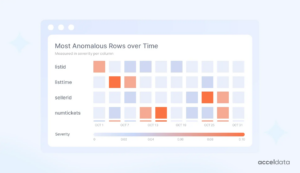
(TippaPatt/Shutterstock)
Acceldata this week unveiled a major update to its data observability platform that it claims can automatically detect hard-to-spot anomalies hidden in customers’ data. The update to the xLake Reasoning Engine comes as Acceldata is setting up to host its user conference, Autonomous 25, next month in San Francisco.
Acceldata says its new Adaptive AI Anomaly Detection offering employs AI agents that use multi-variate analysis capabilities to detect and identify data anomalies that other data observability tools will miss. The anomaly detection agents do this by sampling data that may be spread across multiple locations–including columns, timestamps, or segments, in on-prem and cloud data stores–and searching for correlations that may indicate something is wrong.
Instead of requiring customers to set manual thresholds, AI Anomaly Detection automatically learns from patterns in the customers’ data, the company says, thereby streamlining deployment and enabling the product to highlight the most critical anomalies to the customer first, leading to faster remediation.
Acceldata says this approach enables it to spot the tough data quality issues–such as schema drift in financial transactional databases, data integrity issues of pharmaceutical clinical trial databases, or inventory anomalies across database fields in a consumer product warehouse–that other data quality tools that specialize in one-dimensional problems, like a misplaced zero, will be hard pressed to find.
The new anomaly detection capability is a component of what Acceldata calls its agentic data management strategy, Acceldata CEO Rohit Choudhary says.
“By equipping intelligent agents with advanced capabilities to autonomously detect, prioritize, and resolve complex anomalies, we enable enterprises to uncover hidden patterns and risks that conventional approaches simply miss,” Choudhary stated. “It will detect problems before they cause significant business impact.”
Data quality issues cost companies up to $15 million per year, according to Gartner. Despite spending up to half of their time trying to fix bad data, per a 2016 Harvard Business Review study, only a fraction of data anomalies are actually found, Acceldata says.
Acceldata says its xLake Reasoning Engine, which functions as “a contextual memory of your data operations,” is able to detect issues spanning exabytes worth of data storage in customers’ on-prem and cloud environment. The company says the performance of its data anomaly detection algorithms in the xLake Reasoning Engine gives it a leg up on other data observability tools. That speed-of-detection ultimately translates to better data and better business outcomes, it says.
“Picture this: Your transaction streams start experiencing unexpected anomalies,” Acceldata’s Senior Product Marketing Manager Sonam Jain writes in a blog post. “Immediately, detection agents pick up on this irregularity and alert diagnostic agents, who swiftly assess and identify the underlying causes. Without delay, remediation agents autonomously deploy targeted fixes, while recommendation agents proactively advise on preventive measures for the future. Together, these intelligent agents seamlessly manage your entire data stack at scale, enabling your team to focus on strategic initiatives rather than routine operational firefighting.”
The company will be discussing its new Adaptive AI Anomaly Detection during the Autonomous 25 conference, which is taking place May 19 and 20 at The Pearl in San Francisco. The in-person event will feature a keynote from George Mathew, managing director at Insight Partners, an investory in Acceldata, as well as a keynote from Cassie Kozyrkov, who was formerly Google’s chief decision scientist and is now the CEO of her own firm, Kozyr. Kozyrkov is also a 2019 Person to Watch for BigDATAwire (formerly Datanami).
The event will also feature talks from data leaders at Dun & Bradstreet, Netle, Workday, and Qualcomm, among others. You can get more information about the event and register for it here.
Related Items:
Acceldata Primed for Booming Data Observability Market
How Acceldata Helped T-Mobile’s Data Modernization Strategy
Data Observability in the Age of AI: A Guide for Data Engineers

